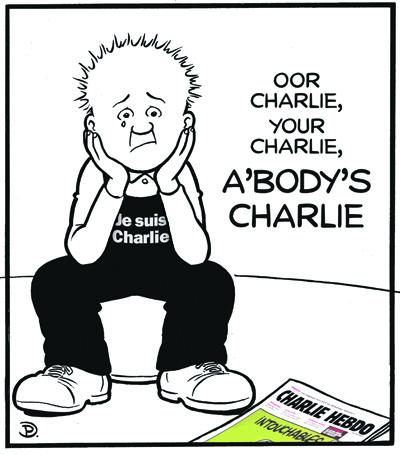Print Media – tabloid headlines artform
Edmodo revision – schedule posted up
Pages to read every week posted to help you to write at an advanced level. Any new words look them up and try to use them. It is best to do a few pages every night rather than 10 pages in one night. The blue pages give practice questions but these are for the English system. They are interesting, but not entirely in line with the stem and three parts / stem and two parts that it looks like.
PowerPoint of mind maps also ready to be viewed.
Should the Police be able to spy on Journalists’ sources?
As the world mourns the attack on press freedom in Paris, it beggars belief that our political leaders should be planning to curb journalists’ ability to protect their sources. And yet, in just seven days, consultation will end on proposals that will allow the police to spy on journalists’ phone records without proper oversight, removing at a swipe historic privileges held by the press in the interests of the public.
In the febrile atmosphere after mindless acts of violence, such as those that occurred in Paris last week, governments – and the UK is no exception – want to be seen to be doing everything they can to track and bring to justice potential terrorists. Yet this very real fear and threat is being used to convince us that historic rights should be curtailed. Not overtly, of course, but in the home secretary’s disregard for the huge opposition to the draft code on the use of the Regulation of Investigatory Powers Act (Ripa) which allows the police and other authorities to continue to access journalists’ communications without any independent process or judicial oversight.
Any connection to terrorism and serious crime is wrongheaded of course, as any application to access phone records when such activity is suspected would be waived through by any judge. Those most likely to be affected will be a whistleblower choosing to phone a journalist with information about anything – including wrongdoing or crime – who expects to remain anonymous. When the Metropolitan police accessed journalists’ phone records at the Sun and Mail on Sunday it was to find out who told them about a minister abusing a police officer and the details of an MP’s speeding offences; neither of them lethal.
If applied in France, or indeed in the UK before Woolwich, these proposals would have effectively meant that associates of the Kouachi brothers or Michael Adebolajo who wanted to warn journalists or other professionals about any worrying behaviour could not keep their identity secret, while doing absolutely nothing to put the Kouachi brothers back on the terror watchlist they inexplicably fell off.
Traditionally the security services and the police have always had the authority to intercept and read any letter or listen in to any phonecall as long as they have a warrant personally signed by the home secretary. Communications metadata needs no such authorisation: the draft code states that UK law enforcement agencies can continue to secretly access journalists’ phone records and approve such requests themselves. All theey need do is give requests to tap journalists’ phones “special consideration”.
Opposition to the proposed changes has united many – and not just among the usual media organisations and freedom of speech campaigners; the Home Office select committee fear the planned changes could enable large-scale data-mining or fishing expeditions of calls made by all citizens.
The deputy prime minister, Nick Clegg, who is to speak at the Journalists’ Charity on Tuesday night to criticise the government’s plans to introduce new internet spying powers, called for a public interest defence for the press to be inserted into legislation like Ripa and the Bribery Act last October.
But he is a rarity indeed among a political class who, possibly correctly, do not see an attack on journalists as a vote-loser.
The speed with which the Ripa proposals could be made law has prompted a last-ditch protest by the Society of Editors and the Press Gazette, which has campaigned on this issue in an effort to “Save our Sources”. They are working on a joint letter condemning the plans, involving upto 3,000 UK editors.
But this isn’t just a matter for journalists; the new code states that “communications data is not subject to any form of professional privilege – the fact a communication took place does not disclose what was discussed, considered or advised”. Which means that calls made to doctors or priests will also be included.
Even MPs, protected by the 1966 ban on the tapping of UK MPs’ and peers’ telephones known as the Wilson doctrine will not be exempt.
1981, when the Contempt of Court Act became law, may seem like a long time ago, but the rights provided seem just as relevant today. The law provides that “in a free and democratic society there is a need to protect journalists sources and presumes in favour of those journalists wishing to protect their sources”. There were four exceptions to this – justice, national security, crime and disorder – and no one is arguing that those exceptions don’t matter just as much, if not more, today. But so does the protection for sources.
Guardian article
Air brushing women out of history
Media Matters – making a profit 2015
New figures published today reveal that the UK’s Creative Industries are now worth £76.9 billion per year to the UK economy.
Growth of almost ten per cent in 2013, three times that of wider UK economy
Accounted for 1.7 million jobs in 2013, 5.6 per cent of UK jobs
2015 set to be another bumper year for UK creative output
New figures published today reveal that the UK’s Creative Industries, which includes the film, television and music industries, are now worth £76.9 billion per year to the UK economy. This massive contribution is an all-time high and equates to £8.8m per hour, or £146,000 every single minute, playing a key role in the Government’s long-term economic plan.The latest statistics come as 2015 looks set to be another bumper year for UK creative talent. There is already a huge number of highly anticipated offerings from every sector of the UK’s creative community; be it the latest Bond film, Spectre, the next instalment of Game Of Thrones, the eagerly awaited conclusion to the Arkham videogame trilogy Batman: Arkham Knight or the publication of the first illustrated editions of the Harry Potter series of novels.
As well as entertaining us, the Creative Industries drive growth, investment and tourism, which is why supporting the sector is a key part of the Government’s long-term economic plan. The tax reliefs in place continue to be a powerful tool in attracting foreign investment, and last year’s publication of the CreateUK strategy set out how Government and industry will work together to ensure the continued success of this dynamic sector.
Key findings from the statistics released include:
Gross Value Added (GVA) for 2012-13 increased by 9.9 per cent – more than three times that of the UK economy as a whole, and higher than any other industry.
GVA of the Creative Industries was £76.9bn in 2013 and accounted for 5.0 per cent of the UK Economy. For the fourth year running, the Creative Industries proportion of total UK GVA was higher than the year before, and is now at a record high.
The Creative Industries accounted for 1.71m jobs in 2013, 5.6 per cent of total UK jobs; and a 1.4 per cent increase on 2012.
The value of services exported by the Creative Industries was £17.3bn in 2012, 8.8 per cent of total UK service exports.
Between 2011 and 2012 the value of service exports from the Creative Industries increased by 11.3 per cent. This compares with an increase of 2.8 per cent for total UK service exports.
Sajid Javid, Secretary of State for Culture, Media and Sport, said:“The UK’s Creative Industries are recognised as world leaders around the globe and today’s figures show that they continue to grow from strength to strength. They are one of our most powerful tools in driving growth, outperforming all other sectors of industry and their contribution to the UK economy is evident to all.
“Government is determined to continue its support for this most dynamic of sectors as part of our long-term economic plan. The tax reliefs we’ve got in place and are extending to Children’s TV and orchestras have been instrumental in attracting inward investment, and are part of broad package of measures designed to ensure the continued success of the Creative Industries.”
Nicola Mendelsohn, industry co-chair of the Creative Industries Council (CIC) and Vice President for EMEA at Facebook said:
“These latest figures highlight the great successes of the UK’s Creative Industries with many developments, initiatives and international awards.
“The Creative Industries Council launched CreateUK last year – the first ever industry-led strategy to ensure growth and secure further jobs in the UK and internationally. It will also play an important role in exporting UK creativity to the rest of the world and encouraging inward investment here.
“2015 is set to be an exciting year with so many highlights to come. We’re well placed to continue to secure the UK’s place as a leading global hub for the Creative Industries for the decades to come.”
Expected highlights of 2015 include:
Film
Avengers: The Age of Ultron (Marvel Studios / Walt Disney Studios) – sequel to 2012’s blockbuster Marvel’s The Avengers
Pan (Warner Bros.) – telling the origins of Peter Pan and Captain Hook, it’s due for release in July 2015
Spectre (Sony Pictures Entertainment / MGM / EON) – the next installment of the 007 franchise
Star Wars: The Force Awakens (Lucasfilm / Walt Disney Studios) – the first film in the planned third Star Wars trilogy
Mission Impossible 5 (Paramount) – Tom Cruise reprises his role as IMF Agent Ethan Hunt in the next chapter of the Mission Impossible saga.
TVHumans – The eight-part series is set in an alternative present, where robotic servants known as “synths” are a must-have accessory (Kudos)
The Casual Vacancy – The adaptation of J.K Rowling’s novel of the same name, starring Michael Gambon, Keeley Hawes, Rory Kinnear, Monica Dolan, Julia McKenzie (HBO/BBC)
Game of Thrones 5 – The fifth series in the global phenomenon reaches UK screens in April (HBO)
The Royals – Drama about a fictional British Royal family set in modern day London (Lionsgate TV)
Downton Abbey 6 – The trials and tribulations of the Grantham’s continue (Carnival Film & TV)
Video GamesBatman Arkham Knight – The Epic Conclusion to the Arkham Trilogy (Rocksteady Studio)
No Man’s Sky – A procedurally generated open universe game. Players take the role of a planetary explorer with a spacecraft (Hello Games)
Tearaway Unfolded – A re-telling of 2013’s hugely successful Tearaway story (Media Molecule)
Fable Legends – The eagerly awaited fifth installment in the Fable series of video games. (Lionhead Studios)
Total War: Attila – The ninth standalone game in the popular Total War series of video games, (The Creative Assembly)
AlbumsUK artists expected to release albums in 2015 include:
Ellie Goulding – The follow up album to 2010’s Lights and 2012’s Halcyon
Coldplay – A Head Full of Dreams, the band’s seventh studio album
Mark Ronson – Uptown Special is Ronson’s fourth studio album and will be released on 19 January 2015 in the UK
Emeli Sande – The second studio album from the Ivor Novello award winning artist is expected later this year
Rita Ora – Due out later this year, Rita Ora’s second album is expected to feature production from Diplo and DJ Mustard, as well as a collaboration with Prince
Books:Robert Harris: Dictator – The long-awaited concluding part of the Cicero Trilogy that began with Imperium (Hutchinson/Penguin Random House)
Mary Beard: SPQR – A history of Ancient Rome – The world’s foremost classicist on the most successful empire in history (Profile Books)
Harry Potter and the Philosopher’s Stone – The first of the illustrated editions of J.K.Rowling’s masterpiece to be published with artwork by Jim Kay (Bloomsbury)
Anthony Horowitz: New (as yet untitled) James Bond novel (Orion / Hachette)
Lynda La Plante: Tennison – a return to the Prime Suspect series (Simon & Schuster)
Media matters – making money
£8 million per hour profit for UK
Official statistics published on 14th January 2014 reveal that the UK’s creative industries are now worth £71.4 billion per year to the UK economy.
Growth of almost 10% in 2012, outperforming all other sectors of UK industry
Accounted for 1.68 million jobs in 2012, 5.6 per cent of UK jobs
Official statistics published today reveal that the UK’s creative Industries, which includes the film, television and music industries, are now worth £71.4 billion per year to the UK economy – generating just over a staggering £8 million pounds an hour.The UK creative industries are renowned across the globe driving growth, investment and tourism. The Creative Industries Economic Estimates are official statistics used to measure the direct economic contribution of the Creative Industries to the UK economy; providing an analysis of the contribution made by the Creative Industries to UK Employment, Gross Value Added (GVA) and Exports of Services.
Key findings include:
GVA (gross value added) of the Creative Industries was £71.4 billion in 2012 and accounted for 5.2 per cent of the UK Economy.
GVA of the Creative Industries has increased by 15.6 per cent since 2008, compared with an increase of 5.4 per cent for the UK Economy as a whole.
GVA of the Creative Industries increased by 9.4 per cent between 2011 and 2012, higher than for any of the other main UK industry sectors.
The Creative Industries accounted for 1.68 million jobs in 2012, 5.6 per cent of the total number of jobs in the UK.
Employment in the Creative Industries increased by 8.6 per cent between 2011 and 2012 a much higher rate than for the UK Economy as a whole (0.7%).
The value of services exported by the Creative Industries was £15.5 billion in 2011, 8.0 per cent of total UK service exports.
Between 2009 and 2011 the value of service exports from the Creative Industries increased by 16.1 per cent. This compares with an increase of 11.5 per cent for total UK service exports.Secretary of State for Culture, Media and Sport, Maria Miller commented:
“These incredible statistics are confirmation that the Creative Industries consistently punch well above their weight, outperforming all the other main industry sectors, and are a powerhouse within the UK economy.
We are committed to ensuring that the energy, innovation, skills and talent existing in this dynamic sector continues to translate into economic success, and provide a remarkable platform from which, we can showcase Britain to the world.”
Creative Industries Council Chair, Nicola Mendelsohn commented:
“These figures amply demonstrate the huge contribution our sector makes to the economy and it’s vital that the right framework is in place to nurture and support the industry. We are working with Government on developing a growth strategy for the sector which will identify how all involved can ensure the creative industries continue to go from strength to strength.”
A teenage perspective on social media sites
Interesting run down of Facebook etc.
Does it match with your experience?
What role does social media have in your life?
Intertextuality example – Oor Wullie tribute to Charlie Hebdo
Sky Academy
I have booked a March slot with Sky TV for a group of students to make a report about mobile phones. I’ll offer it to talented students next week. A way of honing skills with news-style reporting and helping to transfer skills to next year’s potential students. Sign-up if interested.



